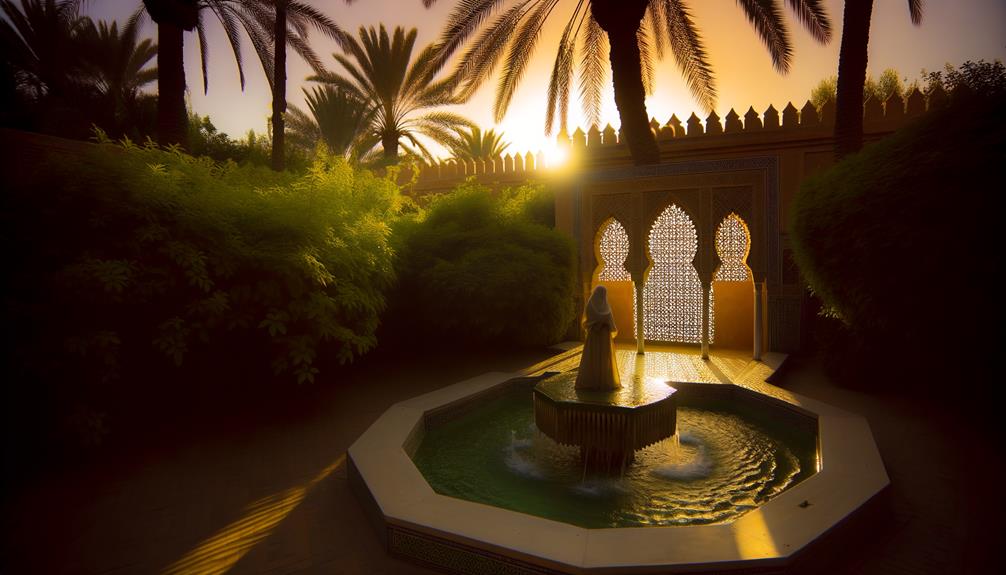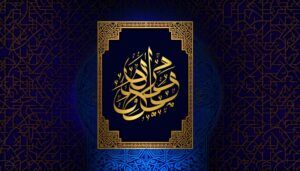Amina Name Meaning in Islam
The name Amina derives from the Arabic root 'amn,' signifying 'peace' and 'security.' In Islamic tradition, it is deeply revered due to its association with Amina bint Wahb, the mother of Prophet Muhammad. This name embodies attributes of faithfulness, protection, and maternal devotion.
Though not explicitly mentioned in the Quran, Amina's influence is underscored through the Prophet's esteemed lineage. Celebrated for her piety, moral character, and resilience, Amina remains a symbol of virtue in Islamic culture and literature.
This exploration reveals the profound cultural and spiritual legacy encapsulated in the name Amina.

Key Takeaways
- Amina means 'peace' and 'security' in Arabic.
- The name signifies faithfulness and protection.
- Amina bint Wahb was the mother of Prophet Muhammad.
- The name embodies virtues of piety, integrity, and resilience.
- Amina is honored for her maternal devotion in Islamic culture.
Etymology and Origins
The name Amina, derived from the Arabic root 'amn' which signifies 'peace' or 'security,' holds significant historical and cultural importance in Islamic tradition. This etymological origin reflects a connotation of trustworthiness and safety, values esteemed in various Islamic cultures.
Linguistically, 'Amina' is a feminine form often associated with attributes of faithfulness and protection. The name's usage predates Islam, resonating through pre-Islamic Arabian society, yet it gained amplified reverence with the emergence of Islamic civilization.
In Arabic, the root 'amn' permeates various derivative words, each embodying aspects of security, trust, and peace, which further enriches the name's profound resonance. Thereby, Amina encapsulates both a linguistic heritage and a cultural ethos that underscores its enduring relevance.
Historical Significance
Renowned for her role as the mother of Prophet Muhammad, Amina bint Wahb holds a monumental place in Islamic history, symbolizing not only maternal devotion but also the broader spiritual and cultural fabric of early Islamic society. Her life and legacy are integral to understanding the foundational narratives of Islam. Amina's nurturing and protective nature has been immortalized through various Hadiths, highlighting her role in shaping the Prophet's early life. Furthermore, her ancestry links to the noble Quraysh tribe, emphasizing her esteemed social standing.
| Aspect | Detail | Significance |
|---|---|---|
| Maternal Role | Mother of Prophet Muhammad | Central to Islamic heritage |
| Ancestry | Noble Quraysh tribe | Symbol of nobility and respect |
| Cultural Impact | Mentioned in Hadiths | Essential in shaping early Islamic narratives |
Amina in the Quran
Though Amina bint Wahb is not mentioned by name in the Quran, her indirect influence is perceived through the reverence and respect afforded to the mother of the Prophet Muhammad. Her legacy can be inferred by considering the Quranic emphasis on the significance of maternal figures and family ties. This influence is underscored by several key Quranic themes:
- The high esteem of mothers: The Quran frequently emphasizes the importance and respect due to mothers, reflecting the elevated status of maternal figures.
- The sanctity of family relations: Family ties are central to Islamic teachings, highlighting the role of mothers.
- The Prophet's lineage: The lineage of the Prophet Muhammad is honored, indirectly uplifting his mother.
- The nurturing of prophets: The Quran often narrates the nurturing roles mothers played in the lives of prophets.
Virtues and Qualities
Amina bint Wahb is often celebrated for her unparalleled virtues and qualities, which include her profound piety, unwavering faith, and exemplary moral character. Her adherence to monotheism, even in a predominantly polytheistic society, exemplified her spiritual fortitude.
Historical accounts frequently highlight her compassionate nature and integrity, setting a moral benchmark for her contemporaries and subsequent generations. Additionally, Amina's resilience and fortitude in facing life's adversities, particularly as the mother of the Prophet Muhammad (PBUH), underscore her steadfastness and inner strength.
Her life serves as an enduring paradigm of virtue, emphasizing the importance of moral rectitude and faith in Islam. Therefore, her legacy continues to inspire and guide those who seek a deeper understanding of Islamic virtues.
Cultural Impact
The cultural impact of Amina bint Wahb extends far beyond her immediate historical context, influencing Islamic traditions, religious narratives, and societal values across generations. Her life and legacy are woven into the fabric of Islamic culture in several significant ways:
- Literature: Amina is frequently depicted in Islamic literature, symbolizing maternal virtue and piety.
- Rituals: Her legacy is honored in various religious ceremonies and prayers within the Muslim community.
- Education: Stories of Amina's life are incorporated into Islamic educational curricula to instill moral values.
- Cultural Identity: Her name endures as a popular choice for girls, reflecting respect and admiration for her legacy.
These elements collectively underscore her enduring influence on Islamic culture and identity.
Famous Namesakes
Prominent figures bearing the name Amina have made noteworthy contributions across various fields, further perpetuating the name's legacy within and beyond Islamic culture. These individuals have excelled in diverse domains, from literature to politics, shaping the socio-cultural landscape and inspiring many.
| Name | Field |
|---|---|
| Amina Wadud | Islamic Scholarship |
| Amina J. Mohammed | Politics |
| Amina Figarova | Music |
| Amina Al-Sadr | Activism |
| Amina Gautier | Literature |
Amina Wadud, an influential Islamic scholar, has been pivotal in discussions on gender and Islam. Amina J. Mohammed, serving as Deputy Secretary-General of the United Nations, has impacted global policy. Amina Figarova, a renowned jazz composer, significantly contributes to contemporary music. Amina Al-Sadr, a notable activist, advocated for social justice, while Amina Gautier's literary works enrich contemporary literature.
Modern Usage
Modern usage of the name Amina reflects its enduring cultural resonance and adaptability within contemporary Islamic and global communities. This name, deeply rooted in Islamic history, has found relevance in modern times due to its phonetic simplicity and profound meaning.
In today's context, Amina is:
- Widely used: Common among Muslim families worldwide, transcending regional boundaries.
- Culturally significant: A reminder of the Prophet Muhammad's mother, symbolizing purity and trust.
- Embraced globally: Adopted by diverse cultures outside the Islamic world, appreciated for its lyrical quality.
- Modernized: Frequently appearing in variations like Amina, Ameena, and Amna, reflecting linguistic diversity.
These factors collectively underscore Amina's sustained popularity and cultural significance in modern society.
Symbolism and Legacy
Beyond its modern usage, Amina's profound symbolism and enduring legacy are deeply embedded in Islamic tradition and history.
Amina bint Wahb, the mother of the Prophet Muhammad, holds a venerable position. Her name, derived from the Arabic root 'A-M-N,' signifies security, trust, and faithfulness, embodying virtues highly esteemed in Islam.
Her legacy transcends mere nomenclature, representing the nurturing and protective qualities essential to Islamic teachings. The name Amina resonates with spiritual and cultural significance, reflecting the ideals of maternal care and unwavering faith.
This historical and symbolic depth makes Amina not merely a name but a beacon of moral and spiritual values, perpetuating its relevance across generations within the Islamic world.
Conclusion
To conclude, the name Amina holds profound significance in Islam, akin to a beacon illuminating the intertwining paths of history, culture, and spirituality. Rooted in etymology and enriched by historical and Quranic references, it embodies virtues of trustworthiness and moral integrity.
The name's cultural impact and legacy continue to resonate, underscoring its timeless relevance. Through its illustrious namesakes and modern usage, Amina remains a symbol of enduring values and esteemed heritage.






